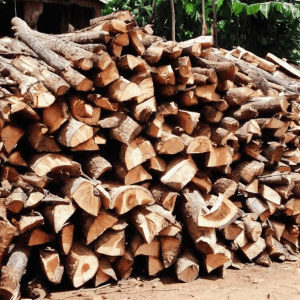
Nigeria, a country rich in natural resources, including oil and natural gas, is paradoxically grappling with a pervasive issue – the majority of its households still rely on primitive and polluting fuels like firewood, charcoal, and kerosene for their cooking and lighting needs. This reliance on traditional fuels is having a devastating impact on public health in Africa’s most populous nation.
The Alarming Reality
Over 92% of rural Nigerian households continue to cook using wood, animal dung, or charcoal over open fires and traditional stoves. In urban areas, kerosene is the primary cooking fuel for working-class and impoverished families. Unfortunately, the use of these traditional fuels results in high levels of household air pollution when burned indoors in poorly ventilated spaces. The smoke generated exposes families to hazardous pollutants like carbon monoxide, formaldehyde, benzene, and fine particulate matter that can penetrate deep into the lungs.
Health Implications
- Respiratory Illnesses
- The immediate health consequences include respiratory diseases such as pneumonia, chronic obstructive pulmonary disease (COPD), asthma, and lung cancer, all exacerbated by indoor air pollution.
- Nigeria has one of the highest rates of childhood pneumonia globally, with around 20% of child deaths attributed to pneumonia.
- Children in homes using firewood or charcoal for cooking have a 2 to 3 times higher risk of severe pneumonia.
- Women exposed to heavy indoor smoke are 3 times more likely to suffer from chronic obstructive pulmonary disease (COPD).
- Cancer
- The carcinogenic compounds in wood smoke, including formaldehyde, benzene, and arsenic, increase the risk of cancers such as nasopharyngeal carcinoma and lung cancer.
- A 2010 meta-analysis found that women cooking with biomass fuels had twice the risk of developing lung cancer compared to those using cleaner fuels.
- Eye Damage
- Wood smoke contributes to a significant risk of blindness and eye diseases in Nigeria, including cataracts, conjunctivitis, and dry eye syndrome.
- A 2012 study in rural Nigeria found that 60% of women who exclusively cooked with firewood had visible eye damage from wood smoke.
- Heart Disease
- The fine particulate matter in biomass smoke not only damages the respiratory system but also enters the bloodstream, increasing the risk of heart disease.
- Nigeria already has high rates of hypertension, and second-hand smoke from cooking fires leads to an estimated additional 3,000 deaths annually from heart disease.
- Birth Outcomes
- Maternal exposure to household air pollution is linked to lower birth weight babies, increasing the risk of infant mortality, cognitive deficiencies, and chronic health conditions.
- Burns
- Nigeria faces one of the world’s highest rates of burn injuries, particularly among children, often resulting from open cooking fires.
The Complex Challenge
The reliance on primitive biomass fuels persists due to a combination of factors, including energy poverty, inadequate infrastructure, and cultural traditions. With a national poverty rate of 40%, many Nigerian families cannot afford to switch to cleaner fuels like electricity or liquefied petroleum gas (LPG). Even when they can, limited distribution networks and high prices create barriers.
Solutions and Progress
Despite these challenges, there are signs of hope. Nigeria’s National Clean Cooking Scheme, launched in 2015, aims to transition households to sustainable energy alternatives, with a target of 90% LPG adoption by 2030. The government, private sector, NGOs, and communities are working together to promote cleaner cooking initiatives, subsidizing LPG, and introducing off-grid solutions.




